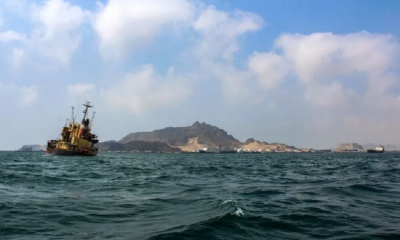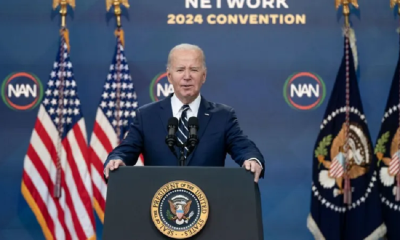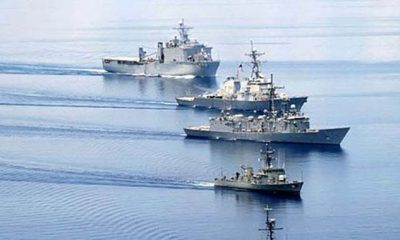Business
Oil supply tightens in Europe over Red Sea disruptions
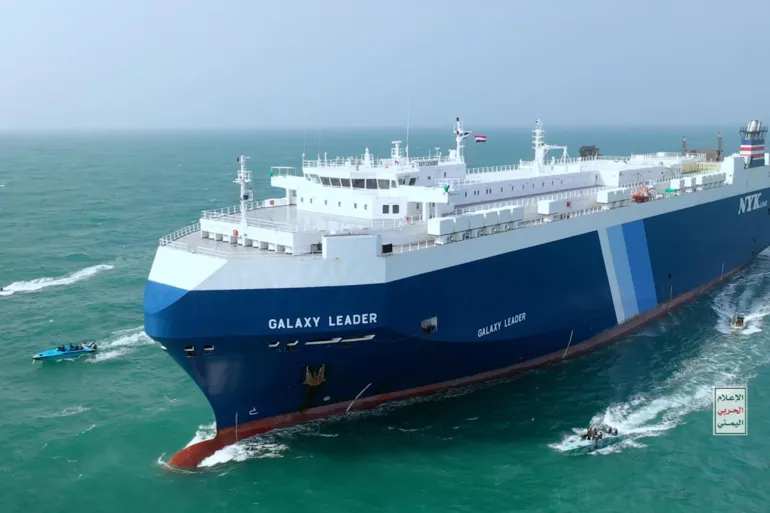
The structure of the global benchmark Brent crude futures market and some physical markets in Europe and Africa have been reflecting tighter supply partly over concerns about shipping delays as vessels avoid the Red Sea due to missile and drone attacks.
The disruptions – which have been the largest to global trade since the COVID-19 pandemic – have combined with other factors such as rising Chinese demand to increase competition for crude supply that does not have to transit the Suez Canal, and analysts say this is most evident in European markets.
In a sign of tighter supply, the market structure of Brent – which is used to price nearly 80 percent of the world’s traded oil – hit its most bullish in two months on Friday, as tankers diverted from the Red Sea following recent air strikes by the United States and United Kingdom on targets in Yemen.
In response to Israel’s war on Gaza, rebels from the Iran-aligned group that controls northern Yemen and its western coastline have launched a wave of assaults on ships in the Red Sea.
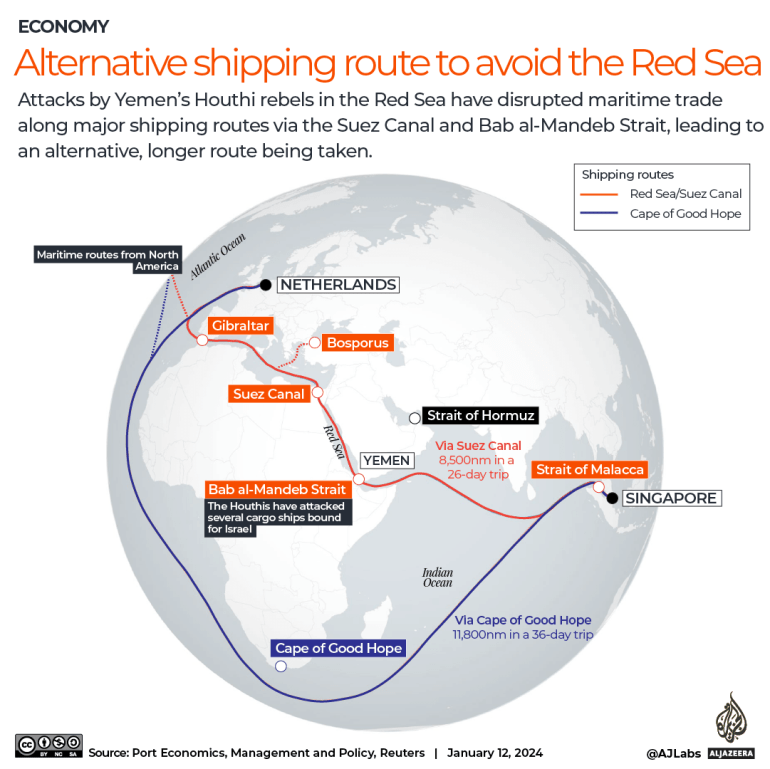
By targeting vessels with perceived links to Israel, the Houthis are attempting to force Tel Aviv to stop the war and allow humanitarian aid into the Gaza Strip.
Houthi activity has so far been concentrated in the narrow strait of Bab al-Mandeb, which connects the Gulf of Aden to the Red Sea. Approximately 50 ships sail through the strait every day, heading to and from the Suez Canal – a central artery for global trade.
Some of the world’s largest shipping companies have suspended transit in the region, forcing vessels to sail around the Cape of Good Hope in Southern Africa. The lengthier route has raised freight rates due to higher fuel, crew and insurance costs.
“Brent is the most impacted futures contract when it comes to Red Sea/Suez Canal disruptions,” Viktor Katona, lead crude analyst at Kpler, told the Reuters news agency. “So who suffers the most on the physical front? Undoubtedly, it is European refiners.”
The premium of the first-month Brent contract to the six-month contract LCOc1-LCOc7 rose to as much as $2.15 a barrel on Friday, the highest since early November. This structure, called backwardation, indicates a perception of tighter supply for prompt delivery.
Less Middle Eastern crude is heading to Europe, with the volume nearly halved to about 570,000 barrels per day (bpd) in December from 1.07 million bpd in October, Kpler data showed.
Ships travelling through the Suez Canal have taken on greater strategic significance since the war in Ukraine, as sanctions against Russia have made Europe more dependent on oil from the Middle East, which supplies one-third of the world’s Brent crude.
But it’s challenging to measure the impact of Red Sea shipping separately, one crude trader told Reuters. “It’s a strong market everywhere, but people are very nervous.”
Other developments have also tightened the European crude market including a drop in Libyan supply due to protests, the first such disruption for months, and lower Nigerian exports.
Angolan crude, which also heads to Europe without having to pass through the Suez Canal, is seeing higher demand from China and India because of issues around Iranian and Russian crude, reducing the supply that could come to Europe.
China’s oil trade with Iran has stalled as Tehran withholds shipments and demands higher prices, while India’s imports of Russian crude have fallen due to currency challenges, although India attributed the drop to unattractive prices.
Meanwhile, Russia leapfrogged Saudi Arabia to become China’s top crude oil supplier in 2023, data showed on Saturday, as the world’s biggest crude importer defied Western sanctions over Russia’s 2022 invasion of Ukraine to buy vast quantities of discounted oil for its processing plants.
Russia shipped a record 107.02 million metric tonnes of crude oil to China last year, equivalent to 2.14 million bpd, the Chinese customs data showed, far more than other major oil exporters such as Saudi Arabia and Iraq.
Imports from Saudi Arabia, previously China’s largest supplier, fell 1.8 percent to 85.96 million tonnes, as the Middle East oil giant lost market share to cheaper Russian crude.
(Aljazeera)
Business
Real economic data isn’t in a report: It’s on a bargain table

If you want to understand Sri Lanka’s economy, don’t start with reports from the Ministry of Finance or the Central Bank. Go instead to a crowded clothing sale on the outskirts of Colombo.
In places like Nugegoda, Nawala, and Maharagama, temporary year-end sales have sprung up everywhere. They draw large crowds – not just bargain hunters, but families carefully planning every rupee. People arrive with SMS alerts on their phones and fixed budgets in their minds. This is not casual shopping. It is a public display of resilience, a tableau of how people are coping.
Tables are set up in parking lots and open halls, clothes spilling from cardboard boxes. When new stock arrives, hands reach in immediately – young and old, men and women – searching for the right size, the least faded colour, the smallest flaw that justifies the price. Everyone is heard negotiating, not with desperation, but with a quiet, shared dignity.
“Look at the prices in the malls, then look here,” says a middle-aged mother shopping for school uniforms in Maharagama. “This isn’t shopping for enjoyment. This is about managing life.” Food prices have already stretched her household budget thin. Here, she can buy trousers for half the usual price.
Women, often the household’s purchasing managers, move with determined efficiency. Men are just as involved – checking stiches, comparing prices, trying shirts over their own clothes. Inflation, here, wears the same face on everyone.
Bright banners promise “Trendy Styles!”, but most shoppers know better. These are last season’s clothes, cleared out to make room for next year’s stock. Still, no one feels embarrassment. “New” now simply means something you didn’t own before; the label matters far less than the price.
Not all items are discounted equally. Essentials – work trousers, denims, track pants – are only slightly cheaper. Sellers know these will sell regardless. The steepest discounts are reserved for the items people can almost afford to skip.
This is economic data you won’t find in official reports. Here, inflation is measured in real time. A young man studies a shirt’s price tag and calculates how many days of work it represents. Friends debate whether a slight fade is a fair trade for the price. Every transaction is a careful calculation.
Year-end sales have always existed. But since the economic crisis, they have taken on a new, grim significance. They offer a slight reprieve to households learning to steadily lower their aspirations. While the government speaks of fiscal discipline and a steady Treasury, everyday life remains a tightrope walk.
The Central Bank measures inflation in percentages. On the streets of Kiribathgoda, it is measured in trade-offs: one item instead of two; buying now or waiting for the Avurudu season; choosing need over want, again and again.
As evening falls, the crowds thin. The tables are left rumpled, hangers scattered like fallen leaves. Yet these spaces tell a story more powerful than any quarterly report – a story of business ingenuity, household struggle, and an economy where every single purchase is weighed with immense care.
In that careful weighing lies a quiet, unsettling truth. No matter what is said about replenished reserves or balanced budgets, these bargain tables – if they could speak – would tell the nation’s most heart-rending story. And they do, to anyone who chooses to listen.
By Sanath Nanayakkare
Business
Global economy poised for growth in 2026, says Goldman Sachs, despite uneven job recovery

The global economy is forecast to expand by a “sturdy” 2.8% in 2026, exceeding consensus expectations, according to the latest Macro Outlook report from Goldman Sachs Research. This optimistic projection highlights a resilient recovery trajectory across major economies, albeit with significant regional variations and a persistent disconnect with labour market strength.
Goldman Sachs economists are most bullish on the United States, expecting GDP growth to accelerate to 2.6%, substantially above consensus estimates. This optimism stems from anticipated tax cuts, easier financial conditions, and a reduced economic drag from tariffs. The report notes that consumers will receive approximately an extra $100 billion in tax refunds in the first half of next year, providing a front-loaded stimulus. A rebound from the past government shutdown is also expected to contribute to what chief economist Jan Hatzius predicts will be “especially strong GDP growth in the first half” of 2026.
China’s economy is projected to grow by 4.8%, underpinned by robust manufacturing and export performance. However, economists caution that parts of the domestic economy continue to show weakness. In the euro area, growth is forecast at a modest 1.3%, supported by fiscal stimulus in Germany and strong growth in Spain, despite the region’s longer-term structural challenges.
A key concern outlined in the report is the stagnant global labour market. Job growth across all major developed economies has fallen well below pre-pandemic 2019 rates. Hatzius links this weakness partly to a sharp downturn in immigration, which has slowed labour force growth, with the disconnect being most pronounced in the United States.
While artificial intelligence (AI) dominates technological discourse, Goldman Sachs economists believe its broad productivity benefits across the wider economy are still several years away, with impacts so far largely confined to the tech sector.
Business
India trains Sri Lankan gem and jewellery artisans in landmark capacity-building programme
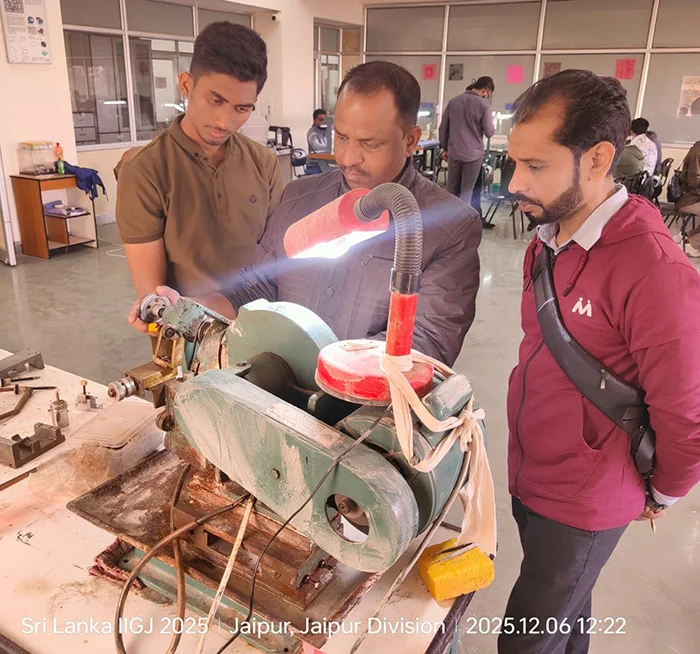
A 20-member delegation of professionals from Sri Lanka’s Gem and Jewellery sector visited India from 1–20 December 2025 to participate in a specialised Training and Capacity Building Programme. The delegation represented the gemstone cutting and polishing segments of Sri Lanka’s Gem and Jewellery industry.
The programme was organised pursuant to the announcement made by Prime Minister of India, Narendra Modi, during his visit to Sri Lanka in April 2025, under which India committed to offering 700 customised training slots annually for Sri Lankan professionals as part of ongoing bilateral capacity-building cooperation.
The 20-day training programme was conducted by the Government of India at the Indian Institute of Gem & Jewellery, Jaipur, Rajasthan. The curriculum comprised a comprehensive set of technical and thematic sessions covering the entire Gem and Jewellery value chain. Key modules included cleaving and sawing, pre-forming, shaping, cutting and faceting, polishing, quality assessment, and industry interactions, aimed at strengthening practical skills and enhancing design and production capabilities.
As part of the experiential learning component, the participants undertook site visits to leading gemstone manufacturing units, gaining first-hand exposure to contemporary production technologies, design development processes, and modern retail practices within India’s Gem and Jewellery ecosystem.
The specialised training programme contributed meaningfully to strengthening professional competencies, promoting knowledge exchange, and deepening institutional and industry linkages in the Gem and Jewellery sector between India and Sri Lanka, reflecting the continued commitment of both countries to capacity building and people-centric economic cooperation.
-

 News6 days ago
News6 days agoMembers of Lankan Community in Washington D.C. donates to ‘Rebuilding Sri Lanka’ Flood Relief Fund
-

 News4 days ago
News4 days agoBritish MP calls on Foreign Secretary to expand sanction package against ‘Sri Lankan war criminals’
-

 Features6 days ago
Features6 days agoGeneral education reforms: What about language and ethnicity?
-
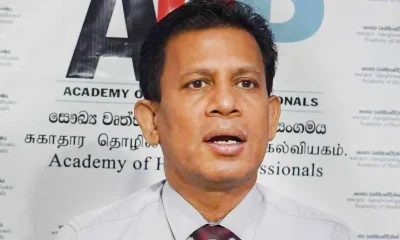
 News6 days ago
News6 days agoSuspension of Indian drug part of cover-up by NMRA: Academy of Health Professionals
-

 Sports4 days ago
Sports4 days agoChief selector’s remarks disappointing says Mickey Arthur
-

 News3 days ago
News3 days agoStreet vendors banned from Kandy City
-

 Editorial6 days ago
Editorial6 days agoA very sad day for the rule of law
-

 News6 days ago
News6 days agoUS Ambassador to Sri Lanka among 29 career diplomats recalled


